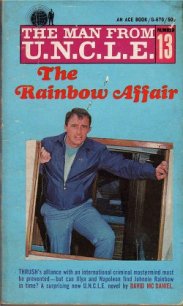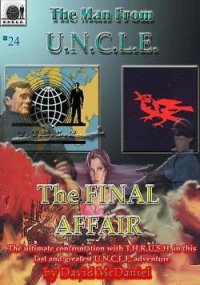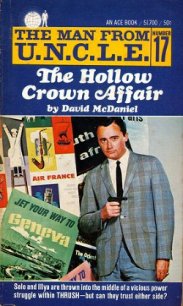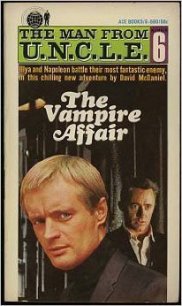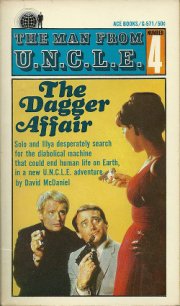The Utopia Affair - McDaniel David (электронные книги без регистрации TXT) 📗
Now, at a signal from the B-R-C, fifteen men took off in ducted-fan vehicles, clearing trees by ten feet, standing in their roaring platforms in a torrent of wind, buffeting the leaves and branches. Four trucks behind them started their engines, and exactly one minute later rumbled off in low gear along a dirt road away from the open field where fifty domelike tents were pitched. Individual transmitters on men and vehicles, tracked by sensitive intermittent receivers keyed to the jamming blanket, sent all movements derived from triangulation and doppler to the B-R-C. All reports were checked visually by a human observer in an absolutely neutral tower. Other observers in fluorescent orange coveralls and hardhats hurried about the area with handi-talkies, sharing a dozen channels with swift precision, occasionally yelling unarguable orders to individuals or whole groups. They were also absolutely neutral, although once in a while they were called upon to defend themselves from individual soldiers whose personal feelings bore no direct relation to the war effort as a whole.
Scattered gunfire was heard over the next ridge as the first wave of Dodgson's attack penetrated the enemy's defenses, and the orange-suited men jumped into jeeps which took off in high gear.
Over there the aircav corps had surprised the enemy's camp, and would hit hard at their inner line. The guerrilla squad hit them three minutes later from behind. Inside a buried room eight miles away, molecules changed state in a unit of time smaller than the mind could comprehend, and currents flowed for less than flickering instants. Circuits closed and things happened. Keys chattered in several locations and screens glowed. Orders went to the men in orange and bullhorn voices shouted commands to the troops in the field. Some inevitably were ordered wiped out without even seeing or knowing their enemy, but the computer knew every thing and calculated the odds. Usually battles were joined, and then the umpires ruled death or life to every man in action.
The timing of the attack had been perfect. With a complicated set of moves in the Game, each timed and directed in perfect coordination, Dodgson's first attack after the early feint had punched a neat hole in the enemy line. Although the actual distance was narrow enough for a shout to carry over, it represented more than two miles and was accordingly judged as difficult to cross.
Silverthorne met Dodgson over dinner late that evening, his face slightly furrowed with thought of the day's final printout. Looking up from his Steak Wellington, in the midst of an objective analysis of the day's play, he said frankly, "Dodgson, I must say your grasp of the Game is remarkable. To have improvised such a perfectly conceived operation as yours today quite puts my efforts to shame."
Dodgson glanced at him beneath bushy eyebrows which rose slightly and wrinkled at the corners. "My thanks, Silverthorne, but I fear your opinion is too complimentary. I spent many days planning it and working out the timing and battle order."
Silverthorne detached a slice of his dinner and ate it neatly. "It was well fought, too. I especially observed the actions of your Fourth Brigade—I must ask for them specifically the next time I play."
Dodgson shifted in his chair, reaching for his pipe and pouch, and the end of a cracked glossy piece of paper stuck out of one pocket, a drab brown with the edge of a yellow band. He fumbled about a moment and measured out the last of his daily ration, tapping the pouch carefully and packing the pipe with great care. Silverthorne's eyes were not riveted on the end of the dust jacket for more than a second or two, and as they flicked back, Dodgson was intent on applying flame to his pipe.
Silverthorne smiled just behind his teeth. It had been the book after all—but not quite the book itself. What an imaginative ploy. The sweet smoke from Dodgson's pipe rose steadily as he said, "In fact, I believe we are very nearly even again."
Smoke flowed gently out with the answer. "Actually, I haven't taken the time this evening to evaluate the final printout. The morning will do as well."
Outside the open window the Austral night was warm, and an especially sensitive nose could have caught the scent of Steak Wellington drifting from the second dining hall. One such nose did. It was immediately beneath a large pair of binoculars gripped in slender, gnarled hands. Through the binoculars a distant window appeared large and unsteady. Two men were visible. At length one rose and beneath the binoculars thin lips parted.
"He is leaving."
"Then let us go to meet him."
Under the shade of a low-bending tree, Illya Kuryakin, dressed in a comfortably loose outfit of dark greenish-brown, reclined almost dozing. His shoulder still ached from the Paynim's caress, and it had been a long day in Room Service. His feet hurt and his back was sore. He rested his head against the bole of the tree and listened to the sounds of the night. He dozed like a cat, awakening at the sound of a footfall and turning to check those who passed on the lighted walk.
And finally Waverly came out, his tall, dark and devious friend beside him.
They parted where the paths did, bidding each other a friendly good evening as though their Game were only a game. And Illya rose and passed like a shadow among the trees, paralleling Waverly's walk home. They could be anywhere along here, attacking from either side.
He had a full clip of sleep darts and the night-vision scope, and his knife was ready to hand. Every sense was alert, straining forward to penetrate the gloom. Stars appeared and vanished among the leaves over head.
The miniaturized light-amplifier in his gunscope, held to his eye, showed him the trees and bushes in shadowgraph with adequate detail—and he froze silently as he saw two crouching figures only fifteen feet away. He faded back behind a tree and heard Waverly's regular pace approaching on the gravel path.
He stole forward with the greatest care, raising his automatic again. He adjusted the little shield around the muzzle which would so break up the slight sound of the silenced shot as to make its location unidentifiable, and leveled it.
They were gone! They had moved out more silently than the wind. He followed them, night-scope to his eye, feeling his way over the leaves and twigs of the garden. Once the figures ahead stopped and started to turn, and Illya melted into the shape of a bush without a sound. After a second they looked in the other direction.
Footsteps were approaching on the gravel path. There was no time for finesse. He saw the Turk's arm draw back and knew the five-second delay of the drug would mean Waverly's life. His wrist flicked and his perfectly balanced knife dropped into his palm. He might not be as good as the Turk, but he didn't have to play fair if they didn't. His arm snapped over and down, wrist locked straight, and a shining silver sliver in the faint light of the stars stood out from the wrist of the up raised arm. The murderous boomerang fell from flaccid fingers to the soft earth and the Turk stifled a cry of pain. Quickly both assassins ducked down as Waverly stopped on the path.
"Who's there?" he demanded. Only silence answered him.
Illya padded forward, a hope growing in his mind. He could see the Japanese, dressed more or less like himself, kneeling beside his partner attending his arm. They looked around cautiously at first, but the pain of the wound drew their attention and Illya dropped to his belly. Still not daring to relax, he was about to withdraw when suddenly both men stood up. Kiazim muttered something unspeakably filthy in Turkish—Illya himself had only heard the term once before. With his friend's help he made it to the path, and the two of them started away, footsteps crunching quickly on the gravel.
